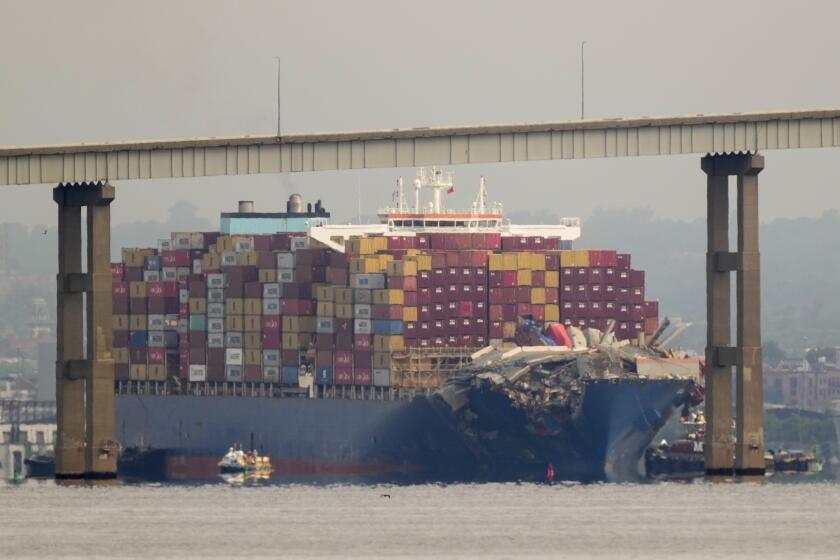Montenegrin Could Foil Milosevic’s Ambitions
While Serbian President Slobodan Milosevic spent the past winter dueling with demonstrators, the most important question that went unanswered involved his political future.
With his term in office coming to an end this year, how would Milosevic, the strongest of Balkan strongmen, retain formal power? Would he rewrite the constitution to allow an unprecedented third term? Or would he find a loophole that would allow him to keep the power that he has used to engineer Balkan warfare and survive the collapse of the former Yugoslav federation?
Only now is an answer coming into focus. In the tea-leaf reading that is Serbian politics, Milosevic has signaled that he may step down from the Serbian presidency to assume the presidency of all of Yugoslavia.
The presidency of the rump Yugoslavia--consisting these days of only Serbia and tiny Montenegro--has been a ceremonial post, dwarfed by the Serbian government.
Milosevic would have to reinvent the job to give it more clout. In recent days, he has transferred some of his most loyal aides--including the key interior minister--from their jobs in the Serbian government to similar positions in the federal Yugoslav government. The moves would put Milosevic in position to control and build up national police forces, analysts say.
And in a drama that is still being played out, Milosevic is attempting to get rid of an especially influential critic: the young and popular prime minister of Montenegro, Milo Djukanovic.
Milosevic needs Montenegro’s obedient votes if he wants to become president of Yugoslavia. The candidate for that post is named by the two houses of the federal parliament, where Montenegro has weight beyond its size.
“The issue for Milosevic is his own skin,” Belgrade political analyst Stojan Cerovic wrote in the respected newsmagazine Vreme. “His last exit may be taking the post of [Yugoslav] president. Without the votes of Montenegro, this is not possible, and if Djukanovic is calling the shots, Milosevic will have to retire.”
*
The campaign by Milosevic and his hard-line Serbian cronies to silence Djukanovic is supported by the president of Montenegro, Momir Bulatovic. In stormy, marathon sessions of Montenegro’s ruling Democratic Party of Socialists, Bulatovic did Milosevic’s bidding by forcing Djukanovic to resign from his party office and demanding that the prime minister fire three of his key ministers. Djukanovic has so far resisted the purge.
What really irks Milosevic, analysts in Belgrade say, is the Montenegrin prime minister’s outspoken criticism of the Serbian regime. He used a February magazine interview to accuse Milosevic of “unexplainable stupidity” in denying opposition victories in November elections, which unleashed weeks of damaging street protests.
“It is completely wrong for Slobodan Milosevic to remain in any position in Yugoslav political life,” Djukanovic said.
Perhaps most bothersome for Milosevic is that Djukanovic has put in force some of the very reforms that Milosevic refuses, and the contrast must be embarrassing to Milosevic.
While retirees in Serbia have not received pensions from a cash-strapped government in months, pension payments in Montenegro are up to date. While Montenegro’s leaders share power, Serbia is governed by one man. Djukanovic is pro-West; Milosevic is isolationist.
*
The pro-Milosevic faction accuses Djukanovic of promoting the secession of Montenegro from Yugoslavia, which would deal the final, humiliating blow to Serbia following the violent departure of Slovenia, Croatia and Bosnia-Herzegovina.
There are allegations that Djukanovic’s distancing from Serbia is not exactly a fight for democracy. It is widely thought that he keeps his state budget afloat thanks to profits from cigarette smuggling and other illicit trade.
But business in Montenegro suffers under the international sanctions levied against Serbia, and Djukanovic would like his pint-size republic--one-sixteenth the size of Serbia, and about the size of Los Angeles and Orange counties combined--to be able to strike its own deals with international lending agencies.
“What the opposition in Serbia intended and promised to do was already started in Montenegro by Djukanovic,” Cerovic said. “Police have received American uniforms. Russia is almost forgotten. Everyone was starting to look toward Italy, Europe and America. . . . Djukanovic is doing exactly the things that the [leader] of Serbia should do if he knew how or were brave enough.”
The battle will come to a head in the next few weeks. The term of Yugoslav President Zoran Lilic ends in June. If Milosevic assumes the job, he would have to call new elections for the Serbian presidency within 60 days. The prospect has already begun to split opposition forces who only just gained a modicum of power when Milosevic finally recognized their victories in several city hall elections.
Times special correspondent Zoran Cirjakovic in Belgrade contributed to this report.
More to Read
Start your day right
Sign up for Essential California for news, features and recommendations from the L.A. Times and beyond in your inbox six days a week.
You may occasionally receive promotional content from the Los Angeles Times.







